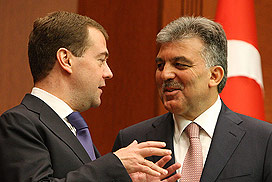Russian plant for Turkey's Akkuyu
13 May 2010
Turkey's first nuclear power plant will be built, owned and operated by Russia after the two countries signed an agreement during a visit by Russian president Dmitry Medvedev to Ankara.
 |
| President Medvedev meets President Gul of Turkey during the official visit. (Image: Presidential Press and Information Office) |
The deal, signed in front of Medvedev and Turkish prime minister Recep Erdogan, covers the construction of four 1200 MWe VVER units at the Akkuyu site on Turkey's Mediterranean coast. Unlike Russia's previous overseas reactor construction projects, however, the plant will be built, operated and middlefinanced through a Russian project company. Russian state nuclear company Rosatom has been given until mid-August to create the subsidiary, which will initially be 100% Russian-owned. In the longer term, Russia may sell up to 49% of the company to other investors from Turkey and elsewhere, but will retain the 51% controlling stake. Turkish firm Park Teknik and state generation company Elektrik Uretim AS (EUAS) have been tipped as likely candidates eventually to take up significant shares in the $20 billion project.
Rosatom head Sergei Kiriyenko described the establishment of a Russian-owned reactor overseas as a long-sought after development, saying it was "much more interesting" to be a co-investor rather than simply the constructor of such projects.
The site for the reactors will be provided by EUAS. The Turkish Electricity Trade and Contract Corporation (TETAS) has guaranteed to purchase a fixed amount of the plant's output (70% of the electricity generated by the first two units and 30% of that from the third and fourth reactors) over the first 15 years of commercial operation at a reported price of 12.35 US cents per kWh, with the rest of the electricity to be sold on the open market by the project company. The reactors are expected to enter service in the period 2016-2019, with the first one due to start up within seven years of receipt of a construction licence and the others following at yearly intervals.
The agreement also provides for Russia and Turkey to cooperate in other areas of the nuclear fuel cycle including the treatment of used nuclear fuel and radioactive waste, decommissioning and the possible construction of a Turkish nuclear fuel fabrication plant. However, such cooperation would be carried out under separate terms.
Both the Turkish and Russian parliaments must now ratify the agreement before it can come into force.
To cut a long story short...
Turkey has for many years been contemplating the possibility of its own nuclear power plant, and the Russian-Turkish agreement is the latest installment in a 40-year long saga. Feasibility studies were first embarked on as long ago as 1970, and the Akkuyu site was licensed for a nuclear plant in 1976. However, successive attempts to launch a construction program through the 1980s and 1990s failed.
Recent years have seen a long drawn-out and ultimately fruitless tendering process, with a consortium of Russia's AtomStroyExport and Turkey's Inter Rao and Park Teknik the sole bidder in the most recent tender, cancelled by the Turkish government at the end of 2009. The Russian tender had been the only one to include the take-back of spent reactor fuel, a stipulation by TETASin that tender and potentially included in the latest deal too.
South Korea is also currently involved in the preparation of a bid to build four nuclear reactors at the Sinop site on Turkey's Black Sea coast.
|
Researched and written
by World Nuclear News